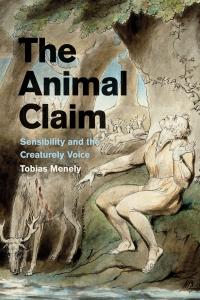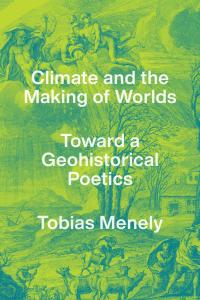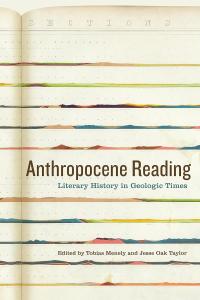
Position Title
Professor and Chair of English
Biography
Tobias Menely joined the faculty at UC Davis in 2014, after teaching at Miami University and Willamette University. He is an ecocritic and environmental humanist, with a primary focus on British literature from Milton to the Romantics.
In 2024, he received a UC Davis Academic Senate Distinguished Teaching Award for Undergraduate Teaching.
Menely's essay, "'The Present Obfuscation': Cowper's Task and the Time of Climate Change" (PMLA 127:3), was awarded the Modern Language Association’s William Riley Parker Prize.
He is currently working on books about the political ecology and technologies of megafauna conservation and about scenarios, models, and fictions as ways of representing planetary futures.
Books

In his first book, The Animal Claim: Sensibility and the Creaturely Voice (The University of Chicago Press, 2015), Menely connects the poetics of sensibility with Enlightenment political theory, humanitarian advocacy, and the debates leading to Britain’s first animal welfare legislation, Martin’s Act of 1822. Some of the perplexities of animal rights as a historical phenomenon, he argues, are resolved if we see rights as neither intrinsic to nature nor contingent on state recognition but as a communicative transaction, a claim—etymologically, a cry or clamor—that precedes the law and yet is only realized in the law. The Animal Claim was a finalist for the Kenshur Prize.

Menely's second book, Climate and the Making of Worlds: Toward a Geohistorical Poetics (The University of Chicago Press, 2021), develops a materialist ecocriticism, tracking the imprint of the planetary across a long literary history of poetic rewritings and critical readings in which what is at stake is climate as a condition of human world making. Climate and the Making of Worlds was awarded the Warren-Brooks Award for Literary Scholarship and Criticism, by the Robert Penn Warren Center; the Michelle Kendrick Memorial Book Prize, by the Society for Literature, Science, and the Arts; and was a finalist for the Association for the Study of Literature and the Environment Ecocriticism Book Award.

With Jesse Oak Taylor, Menely co-edited Anthropocene Reading: Literary History in Geologic Times, published by Pennsylvania State University Press in November 2017.
Published Essays
"Worlds Ready for Moa: The Pasts and Futures of De-extinction." Configurations. Species issue, "The Art and Science of Species Revival." Ed. Peter Sands and Sarah Bezan. 2025.
"Geomythography: A Genealogy." In Histories of Science: Natural Philosophy in the Eighteenth-Century Atlantic World. Ed. David Alff and Danielle Spratt. University of Virginia Press, 2025.
“Creation Stories: Reproductive Crisis and the ‘Birth / Abortive’ of Science Fiction.” European Romantic Review 35.1 (2024).
“Possible Futures in a Warming World: Teaching Climate Models and Other Climate Fictions.” In Teaching the Literature of Climate Change. Ed. Debby Rosenthal. Modern Language Association, 2024.
"Rewilding with Romanticism." Studies in Romanticism 62.1 (Spring 2023): 9-18.
“Habitat: Worlds of Wildlife.” In Cambridge Companion to Literature and Animals. Ed. Derek Ryan. Cambridge University Press.
“Samuel Johnson’s The History of Rasselas, Prince of Abissinia.” Handbook of the British Novel in the Long Eighteenth Century. Ed. Katrin Berndt and Alessa Johns. De Gruyter. 2022.
“Commodify.” In Veer Ecology. Ed. Jeffrey Cohen and Lowell Duckert. University of Minnesota Press. 2017.
“Ecologies of Time.” In Time and Literature. Ed. Thomas Allen. Cambridge University Press. 2017.
“Late Holocene Poetics: Genre and Geohistory in Beachy Head.” European Romantic Review 28.3 (2017): 307-314.
“Anthropocene Air.” the minnesota review 81 (2014): 92-101. Special issue, “Writing the Anthropocene.” Ed. Kate Marshall and Tobias Boes.
“‘The Present Obfuscation’: Cowper’s Task and the Time of Climate Change.” PMLA 127:3 (May 2012).
“Red.” Co-written with Margaret Ronda. Prismatic Ecology: Ecotheory Beyond Green. Ed. Jeffrey Cohen. University of Minnesota Press. 2013. 22-41.
“Acts of Sympathy: Abolitionist Poetry and Transatlantic Identification.” Affect and Abolition in the Anglo-Atlantic, 1770-1830. Ed. Stephen Ahern. Ashgate Press. 2013. 45-67.
“Sovereign Violence and the Figure of the Animal, from Leviathan to Windsor-Forest.” Journal for Eighteenth-Century Studies 33:4 (Winter 2010): 567-82. Special issue, “Representing Animals.”
“Returning to Emotion, via the Age of Sensibility.” Review Essay. Eighteenth-Century Life 34.1 (Winter 2009): 114-24.
“Zoöphilpsychosis: Why Animals Are What’s Wrong With Sentimentality.” symploke 15.1/2 (Dec. 2007): 244-67.
“Animal Signs and Ethical Significance: Expressive Creatures in the British Georgic.” Mosaic 39.4 (Dec. 2006): 111-27. Special issue, “The Animal.”
“Traveling in Place: Gilbert White’s Cosmopolitan Parochialism.” Eighteenth-Century Life 28.3 (Fall 2004): 46-65.
Education
- PhD, Indiana University
- BA, Beloit College
